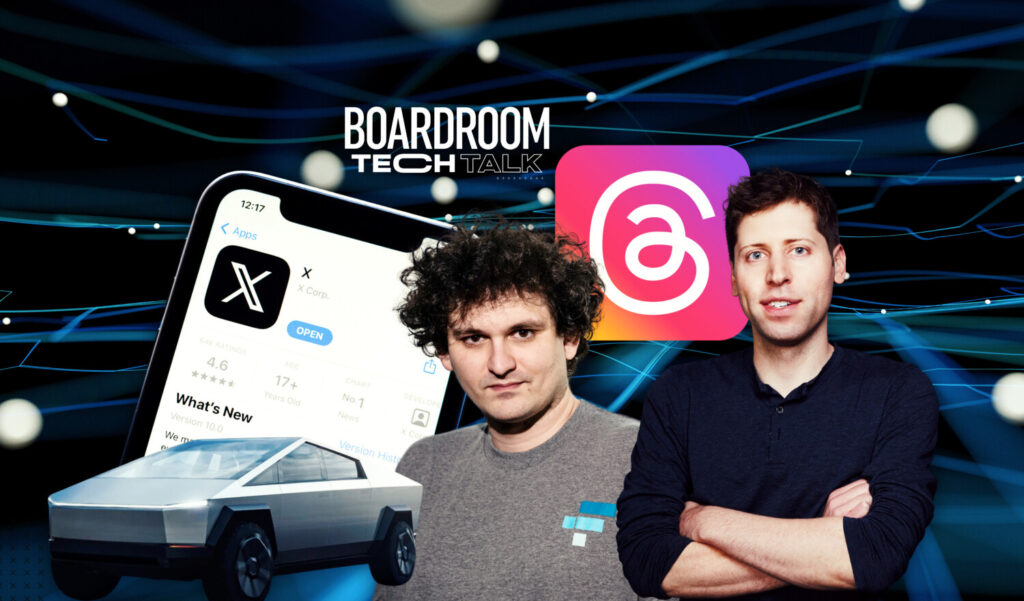From CEO oustings to new market capitalizations, the text-based app war, and much more. Boardroom runs down 10 of the biggest tech moments, announcements, and headlines from 2023.
Another year is coming to a close, and now, more than ever, the tech industry is moving and shaking things up. New tech companies are rising to the top, and the Big Tech giants are expanding with new tech and products to stay in the race.
To cap off another eventful year, Boardroom details 10 of the biggest tech moments, announcements, and headlines from 2023. In no particular order, here we go.
10 of the Biggest Tech Moments of 2023
OpenAI fired Sam Altman, then hired him back in a week.
OpenAI‘s board fired its CEO and co-founder Sam Altman in mid-November in an unexpected coup before rehiring the AI tycoon less than a week later. Altman’s return came with a new board and little to no confirmed explanation from OpenAI as to why he was ousted in the first place. The entire debacle from bizarre, and every day for a week, it seemed like more and more tea was getting spilled.
Microsoft finally got clearance to acquire Activision Blizzard.
In October, Microsoft officially got the green light to acquire video game giant Activision Blizzard for $69 billion. The Big Tech leader first bid to acquire Activision in January 2022, with its biggest hurdle being UK regulators. After negotiating some changes to the costly contract, Microsoft moved closer to pulling off its biggest deal yet. The acquisition deal closed the same day both parties signed the contract.
Sam Bankman-Fried was found guilty.
Nearly a year after getting arrested in the Bahamas and extradited to the US, disgraced ex-FTX CEO Sam Bankman-Fried was found guilty of multiple charges of fraud and conspiracy at the top of November. SBF spent five weeks in court trying to convince a jury that he didn’t steal billions of dollars and defraud FTX customers. The former crypto leader will be sentenced on March 28, 2024; he’s facing a maximum of 115 years in prison.
Google launched an AI chatbot called Bard.
In March, Google opened public access to Bard AI, its flagship competitor to OpenAI’s ChatGPT. Google’s conversational and generative artificial intelligence-enabled chatbot hasn’t risen to popularity like ChatGPT has, but it’s still in the early days of the AI chatbot race.
Twitter officially became X while legacy users flocked to other apps.
Elon Musk officially rebranded Twitter as X in July, sunsetting the icon blue bird logo we’ve known and loved for over a decade. X has been pushing hard to become the “everything app” this year but has steep competition now. As X continues to make changes, there has been a surge in other text-based apps like Bluesky, Spill, and Meta’s newest app.
Meta launched a new text-based app called Threads.
Meta once again shocked the social media world when it launched a new text-based conversation app called Threads in July. The primary purpose of Threads is to be an app more focused on text and dialogue, modeled after what Instagram has done for photos and videos. Since its launch, the new app has attracted approximately 100 million monthly active users. Threads came in a “year of efficiency” for Meta, which also saw its stock surge as much as 176% in 2023.
Apple hit a historic milestone with a $3 trillion market cap.
Apple made history in July when it again hit a $3 trillion market capitalization. The Big Tech giant is the first public company to reach that milestone and has done it twice. The accolade came a month after Apple announced that it would release its first virtual reality and augmented reality headset, the Apple Vision Pro. The headset is set to launch in early 2024.
Google loses to Epic Games in court.
A jury unanimously sided with Epic Games over Google in an antitrust case that started three years ago when the Fortnite creator filed a lawsuit against the Big Tech company for charging higher than normal app store fees and restricting payment systems. Epic Games hopes this court decision will force Google to allow app developers to use alternative payment systems within their apps or run their own app stores on Android. Right now, Google gets a 30% cut of in-app purchases. We’ll know more about Google’s app store changes in January.
AI-generated “Heart on My Sleeve” song goes viral.
An AI-generated song featuring vocals from Drake and The Weeknd went viral in April, sparking a larger discussion about the use of AI across the music industry. Drake and The Weeknd didn’t agree to let their voices be featured on the song “Heart on My Sleeve,” anonymously produced by TikToker Ghostwriter977. After a short viral stint, major social media and streaming platforms removed Ghostwriter’s original posts for infringing content creation with generative AI.
Tesla’s Cybertruck finally hit the road.
Tesla began delivering the first round of its much-anticipated Cybertrucks at the end of November, two years after it originally planned to roll them out. The new electric-powered vehicle with a futuristic trapezoid-like design is Tesla’s first new model in three years. The electric automotive maker plans to produce 250,000 Cybertrucks a year once it reaches full production mode.
